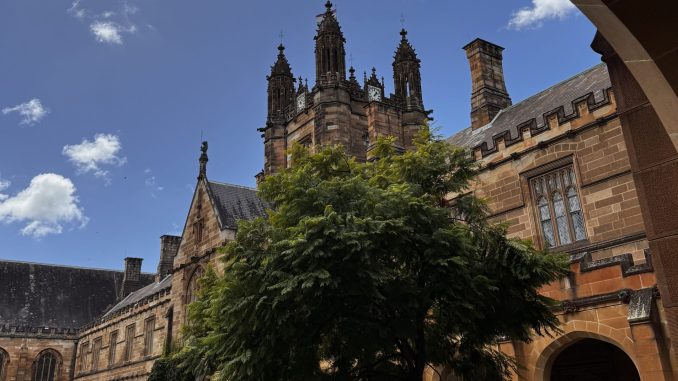
Arriving in Sydney as a future international student in the beginning of 2024 was thrilling.
After having to go through multiple levels of bureaucratic issues in my home country only to just prove my eligibility for a student visa in Australia, I thought the tension would only grow.
I was prepared to be challenged, and that was what I expected to see everyone in class going through.
It was meant to be the beginning of something big – meeting new people as passionate about the field of study as I was, being challenged, and building a professional network for the futures of all of those enrolled. That was the promise evenly spread all over the University of Sydney’s marketing campaigns. That was what I chose, and what I patiently saved money for, for a long period of time.
What went wrong?
Even with a 20% University contribution, the degree has cost me over $63,000. I was paying out of my own pocket, believing this would be worth it. But as the weeks passed, something started to feel off.

I couldn’t explain it at first – maybe I was stressed, or just trying too hard to adjust. But slowly I realised it was not just me. The classes felt empty, not in numbers, but in energy. The discussions weren’t really discussions. Some students didn’t speak at all – and not because they were shy, but because they couldn’t keep up in English.
Eventually I understood: this isn’t what the entire program was going to look like, and started wondering whether it was just my experience, just the program I was taking, or just this university.
Turns out, I wasn’t alone in feeling that way.
Over the past year and a half, I’ve met many international students. Whether it was Melbourne, Brisbane, or Tasmania – whether it was Go8 or a smaller institution – we kept coming back to the same conversation. This system, the one we fund, is letting us down.
Not a one-off case
For many people, coming to Australia to study is similar to a millenial’s dream to buy a house – a life goal, so expensive and unreal, that you dream of it for many years before achieving it. And not everyone ends up having an opportunity to do so.
I recently spoke to German, an international student in the past, and a civil engineering graduate from UTS. About the brand of Australian education he said “It’s well promoted that local education has high standard levels.”
Australian marketers use the idea that education here is world-class widely. But the reality is more complicated. In many classrooms, there’s a disconnect – between what’s promised and what’s delivered, between what students expect and what they get.
German’s program cost $80,000 across two years, fully paid by a scholarship provided by his home country government. Still, he says he felt short-changed: “There was no quality standard in most of the classes,” he shared. “Doing the bare minimum was enough to get a distinction.”
Assignments, he said, were often copy-paste jobs. Group projects were draining not because of the work, but because of the imbalance – some students just didn’t do much, and those who cared had to pick up the slack: “I definitely wasn’t planning on motivating other students to do the job,” he said.
Trying to gather a quote from a professor, German said “Education in UTS is pretty much like McDonalds.
“Everything is fast-paced, and it’s focused on making as much money as possible on the students.”
Being asked whether German felt it was true, he replied “Absolutely, yes.”
Engagement in class
German also shared what he saw his tutors struggled to achieve. There’s no doubt that some teachers care deeply and try hard: “They can’t get all their students involved, it’s just impossible.
“98 percent of students are just … there.”
I knew what German was talking about. Same as he did, I often felt that I was one of very few students who were in class to learn, not to just mark attendance.
Talking about working on group projects, feelings get even more intense: “Even students who are actually engaged and want to learn … they can’t do it as well because of the group projects,” German shared.
“Instead of studying you have to … I guess you develop management skill … I definitely wasn’t planning on motivating other students to do their job.
“Considering that’s a masters program, that’s just unbelievable, to be honest.”
Big business
In 2022, international students contributed $8.5 billion to Australian universities, a noticeable rise from $4 billion in 2012. These students have become essential to university budgets, yet many feel their educational experience is compromised.
In 2024, almost half a million people arrived in Australia to get higher education. Among these, the Go8 universities saw a significant level of enrolments. In 2024, approximately 160,000 international students enrolled into these institutions, marking a 32% increase compared to pre-pandemic levels.
Australia’s education sector is undeniably lucrative, branded as a “big business,” ranking among the biggest exports. But beneath these glowing statistics, the lived reality of students tells a different story.

In 2025, it will cost around $55,000 per year for an international student to study at the University of Sydney. Across Go8 universities – the most prestigious group in the country – international students are charged between $30,000 and $54,000 per year depending on their degree. Business programs can hit the upper end, while arts and science sit slightly lower. Still, we are talking about tens of thousands of dollars every year – far more than domestic students pay, and completely out of reach for many without taking on major debt or sacrifices.

This issue isn’t new. Previous Guardian reports highlighted declining English standards and the alarming commercialisation of Australian degrees. Yet, the voices of students themselves – those who are left to finance this system after the government stopped funding the universities – often remain unheard.
Australia stands at a crossroads – or at least it should. While international students fund a significant portion of university revenue, their educational experiences increasingly contradict the promises made. For a country that prides itself on education as a cornerstone of its international appeal, addressing these frustrations isn’t just ethical – it’s essential.


Be the first to comment